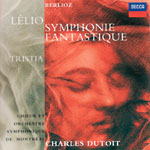Berlioz’s Lélio actually is a compilation of previously composed pieces, linked by narration into a quasi-dramatic framework. The sole protagonist is Lélio, formerly known as “the Artist” from Symphonie fantastique. Lélio’s monologue is a rambling affair (consuming more than one-third the work) during which he frets and pants about love, art, and music. The musical sections (variously scored for orchestra, soloists, and chorus) act as interludes, culminating in a premiere performance of Lélio’s newest creation, the brief Fantasy on Shakespeare’s Tempest for chorus and orchestra. It’s all very interesting, even fun–the first time. Afterward you may find yourself utilizing the magic of CD technology to program out all the chatter and just stick to the music. Lambert Wilson’s narration is as ardent as the composer could wish, while tenors Richard Clement and Gordon Gietz and baritone Philippe Rouillon perform their contributions with tonal beauty and technical polish. Charles Dutoit creates a light-textured yet somewhat subdued atmosphere with his choral and orchestral forces, lacking the requisite sense of fantasy.
Similarly, this 1985 Fantastique carves out the middle ground between exciting and bland as Dutoit plays it safe with predictable tempo relationships and orchestral balances. Everything is clear and orderly. No, it’s not exactly dull, but you certainly won’t find yourself getting caught up in the music the way you would with Bernstein’s “drug trip” rendition, or Munch’s feverish nightmare. There’s no shock as the guillotine blade falls in the March to the Scaffold, and the Witches Sabbath sounds more like a lively cocktail party.
Finally, there’s Tristia, which benefits here from the Montreal Symphony Chorus’ idiomatically French singing and Dutoit’s mostly sensitive conducting. But then, there’s rival Frenchman Pierre Boulez’s more spirited account that conjures more nervous anxiety in the Death of Ophelia and evokes more terror in the Hamlet Funeral March. Boulez’s recording is coupled with a very fine Fantastique (stunningly played by the Cleveland Orchestra), making his disc quite attractive. However, if you insist on a modern recording of Lélio, this vivid and atmospherically recorded disc will do you no harm.
































